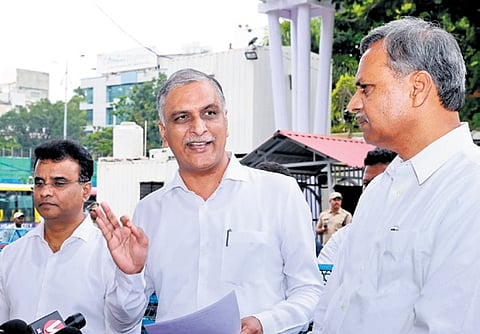

HYDERABAD: Representatives of Telangana local bodies as well as political parties sought greater share in devolution of taxes from the Union government to the state.
They submitted their suggestions to Sixteenth Finance Commission (SFC) chairman Arvind Panagariya, who held a series of meetings with the representatives of panchayats, GHMC and also with leaders of various political parties here on Monday.
Municipal chairpersons, former sarpanches and representatives of various business and trade organisations, members of state finance commission also met the SFC team, which also comprised secretary Ritvik Pandey and members Ajay Narayan Jha, Annie George Mathew, Manoj Panda and Soumya Kanti Ghosh.
Principal Secretary, Municipal Administration, Dana Kishore briefed the committee members about the status of urban local bodies in the state. Panchayat Raj secretary Lokesh Kumar and other officials also presented an overview of the state.
The SFC chairman also interacted with several trade bodies like FICCI and CII. Members of various trade bodies sought change in criteria of devolution, which should incentivise a performing state.
The industry bodies wanted a special fund for revival of industries that have turned sick during Covid-19. Special Chief Secretary Finance K Ramakrishna Rao and other officials also attended the meeting.
BRS wants tax share increased to 50%
Opposition BRS requested the visiting SFC to increase the states’ share in Central taxes. Former minister T Harish Rao, along with other BRS leaders, participated in the meeting.
“We opine that it is the need of the hour that states’ shares in Central taxes needs to be increased from the present 41% to 50%. This can easily be accommodated by about 20% reduction in the expenditure of the Centre on state and concurrent subjects,” they said.
“At the time of framing the Constitution, non-tax revenues were insignificant and therefore not included in the divisible pool. But over the years, non-tax revenues of the Centre have become more buoyant. Non-tax revenues, which are not shared with states, have increased from a mere Rs 175 crore in 1960-61 to Rs 2.85 lakh crore in 2022-23. An amount of Rs 5.46 lakh crore is budgeted in 2024-25. Therefore, there is a case for the inclusion of non-tax revenues in the divisible pool,” they demanded.
The BRS also suggested that the weight of 45% assigned to distance of per capita income may be reduced to 30%. “Currently, tax effort is assigned an insignificant weight of 2.5%. There is a need to incentivise states which have improved their tax collections and their base and to encourage other states to follow suit. Tax revenues are the most important source of own revenues of states and constitute over 80% of states own revenue receipts. We request that weight assigned to tax effort may be increased to 10%,” Harish said.
Hold collectors responsible for diversion of funds: BJP
Meanwhile, BJP MP Eatala Rajender, party’s state general secretary Kasam Venkateswarlu and state secretary S Prakash Reddy urged the SFC to come up with a norm that seriously prevents the states from diverting funds released under a certain head by introducing strict and penal provisions. The previous BRS government and the present Congress government have mastered the art of diverting funds, they alleged.
“Funds released to the local bodies ought to be spent only by the local bodies, and the district collectors should be held responsible for any diversion of the fund or delay in allocation. Local bodies alone should have control over the funds,” they added.
The BJP suggested that the Finance Commission include incentives for states that place an emphasis on reforming healthcare, education, and the environment as well as sustainable development. The BJP suggested conditional grants linked to states’ success in implementing schemes like crop diversification, agri-tech innovations and water management projects.